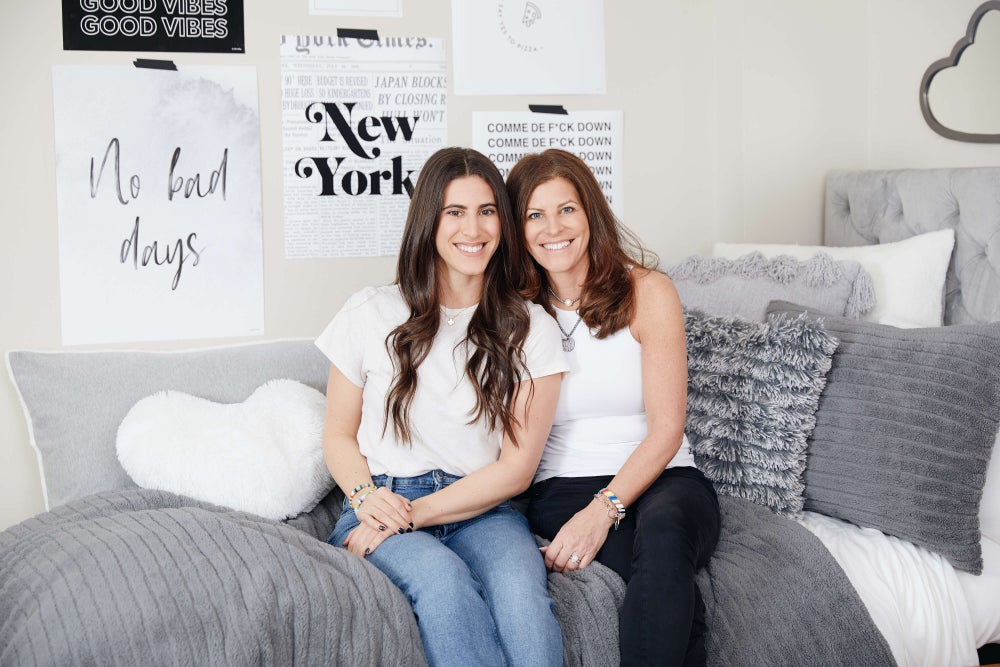In 2009, 18-year-old Amanda Zuckerman was shopping for college dorm room supplies with her mother Karen when “[they] were really surprised to find that stylish twin XL bedding and everything that you need for outfitting and organizing a small space was practically non-existent, and was not sold in one place,” she says. So, in the middle of Bed Bath & Beyond, the pair resolved to design their own dorm room bedding line.
 Image Credit: Courtesy of Dormify. Amanda Zuckerman, left; Karen Zuckerman, right.
Image Credit: Courtesy of Dormify. Amanda Zuckerman, left; Karen Zuckerman, right.
Fast-forward to Zuckerman’s sophomore year of college, and Dormify was officially born. The mother-daughter team launched a blog about college life and dorm decor. Zuckerman’s friends contributed as writers, ultimately growing an extensive network of brand ambassadors that offered “proof of concept” in the era just before social media filled that gap. Print-to-order posters became the company’s first product line.
Despite not raising much capital off the bat, as was common with direct-to-consumer brands at the time, the small space decorating business Zuckerman started in her dorm room would transform into a multimillion-dollar company thanks to its “grassroots tactics.” Dormify hosted trunk shows so people could interact with the product, “very much like Tupperware parties back in the day,” Zuckerman says. Eventually, those efforts led to seasonal pop-ups and retail partnerships in more than 200 stores.
“It’s hard because we have a new customer every single year.”
Of course, as Dormify surpassed a decade in business, its core customer base evolved along with it — from millennials to Gen Z. “It’s hard because we have a new customer every single year,” Zuckerman says. “So it’s not just about acquiring them and continuing to nurture that customer. It’s acquiring a new customer every single year.”
When it comes to catering to Gen Z, business owners shouldn’t underestimate the importance of social media. Not only has the phenomenon been key to Dormify’s growth over the years, but it’s also giving the company a critical direct line to its current customers. However, like all brands, Dormify must be nimble and strategic across its social channels to win over Gen Z.
 Image Credit: Courtesy of Dormify
Image Credit: Courtesy of Dormify
“With all communications with the Gen Z consumer, who is who we are talking to, not their parents, [it’s essential] to engage authentically and provide products, content [and] advice that is genuinely beneficial to them,” Zuckerman says.
“It’s not just about selling them a product to put in their space. It’s about making them feel comfortable.”
That means striking a balance between being approachable and having authority, according to the founder.
“We want this audience to think of us as a big sister,” Zuckerman explains, “and that’s how we’ve positioned the brand. So it’s not just about selling them a product to put in their space. It’s about making them feel comfortable in this transition to college. It’s about helping them anticipate what challenges they’re going to have to deal with, like living with a stranger or leaving home for the first time.”
Gen Z is exposed to endless choices every day, bombarded with marketing and advertisements when they scroll Instagram or TikTok, so brands should avoid coming off as too “sales-y” if they want to have success, Zuckerman says.
Dormify prioritizes entertainment, informative content and community building on its social channels over pure revenue and sales plays. In fact, according to Zuckerman, it’s a mistake to rely on revenue as a key performance indicator for social channels at all.
“If that influencer is just putting out tons of sponsored content, this audience is so much more savvy than that.”
Additionally, Zuckerman notes that although some brands are skilled at finding influencers who drive customer acquisition, others miss the mark on that front.
“There are a lot of companies that don’t understand what Gen Z is looking for and think that just hiring or paying an influencer is going to generate sales or connection or loyalty to a brand,” Zuckerman explains, “but if that influencer is just putting out tons of sponsored content, this audience is so much more savvy than that.”
 Image Credit: Courtesy of Dormify
Image Credit: Courtesy of Dormify
Related: Traditional Marketing Doesn’t Work on Gen-Z and Millennials. Here’s What to Do Instead.
Dormify gives its social media interns and coordinators “a lot of freedom and independence” to run the company channels as they see fit. “We’re not over-managing them,” Zuckerman says. “We are letting them do what they think will work, what they want to do. It’s a lot of trial and error. Having too many constraints on a social channel can lead to poor engagement.”
According to Zuckerman, Dormify boasts a more than 8% engagement rate across its social channels, significantly outperforming the retail industry average. In June 2024, the retail industry’s average engagement rate ranged from .59% (TikTok) to 1.62% (Instagram), depending on the platform, per data from the social media performance engine Hootsuite.
“I’m excited to continue to evolve how we are communicating with our customers.”
Dormify also faces the challenge of engaging Gen Z shoppers as a seasonal business. The key is to continue growing with its customers — for example, keeping track of when those first-year college students designing their dorms become seniors who need diploma frames. The company is also mindful of its adjacent audiences: tweens decorating their bedrooms or campers outfitting their bunks.
“I’m excited to continue to expand the product,” Zuckerman says, “and I’m excited to continue to evolve how we are communicating with our customers and doing things differently than many companies out there.”


